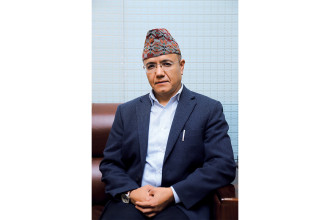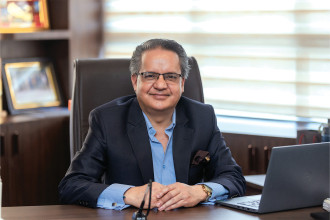
Karmath Dangol is Vice President of Engineering at CloudFactory.com. CloudFactory is a crowd sourcing company based in Nepal working towards creating meaningful work for one million people. Dangol, an IT professional and an entrepreneur with two decades of experience in tech industry and startups both in USA and Nepal, is also Co-founder of Nepal Entrepreneurs’ Hub (NeHub). NeHub is dedicated to nurturing entrepreneurship, support startup communities, contribute towards a vibrant entrepreneurial ecosystem and facilitate investment in budding, small and medium enterprises. While in the US, he co-founded NextAction.net (acquired by datalogix.com and now part of Oracle), a direct marketing company that provides a cooperative database for catalog acquisition marketing. He has also pioneered and lead internet marketing solutions team at eBay. And helped the quantitative marketing team at Google Inc. as a consultant. Below he shares his views on leadership:
What is your definition of leadership?
Leadership is a decision making progress, setting strategic vision of a company, guiding when to do what determining the priorities of work. It is a secondary thing how to do that work, what to do first is the most important thing.
What should be the qualities of a good leader?
It’s a balancing act. Keeping in line with balancing skills are needs of internal staff together with execution of strategic vision of a company. As a leader we always have to look from the business side. In our company change is so constant. The good quality of the leader lies in how to bring the rest of team onboard, who are not involved in the decision making.
Could you tell us about yourself as a leader of your organisation? What are your personal strengths and weaknesses?
I lead the engineering team. I am responsible for everyone who works in this department. I consider myself as an enabler than as a leader. I take the backseat approach and help my team, guide them without them realising I am guiding them. I think that is my strength. I understand their needs before they demand it - be it tools, fun activities or training and am always proactive in regard to it. About weaknesses, I am never satisfied with the speed of progress I make. When I work alone I could do things more. When you have a team, you have dependency, especially with a distributive team the dependency is more. I am never happy with the progress. Though I look after the technical department, I understand the business more which helps me in decision making.
 How does your work impact others?
How does your work impact others?
The IT scene is very new in Nepal and lacks experienced professionals. Even our company has started hiring freshers. I spent half of my life in the US. Here the trend of going abroad is so popular. I tell them the reasons I came back. I tend to give them opportunities. We have a global scholar exchange program giving them international exposure. Mostly the top executives are foreigners, I try electing the local ones, and bring the local flavour in the work. In the last five years, the team has grown. Earlier, we only had office in Nepal.
What does success mean to you?
Getting myself out of job. My role is to seek my replacement. Success means I am no longer required for the company, somebody else can take my place and hopefully I can climb up and explore new opportunities.
What are the privileges of being a leader?
I am in a team that defines the strategic part of the company. When it comes to our organisation, we don’t have a 9 to 5 job and that’s a privilege too: we can work 24 hours, seven days. Being in a technical team we have to respond anytime.
Leadership is not about you, it is about others, the people who are following you, people you are responsible for. Do you agree?
Definitely! I represent the engineering team. I become their voice. I guide the team and keep them happy. Recognizing the strengths of my team, I sometimes push them into a direction they don’t want to go. It goes back in my own career when I was an engineer, I would not get involved in anything, and one day my supervisor had sent me for a client meeting. Since then I am a changed man. I was actually upset why he put me into that situation. But he saw that thing in me which I hadn’t. I am also pushing the growth of my staffs in new roles, or simple as public speaking or presenting papers in a conference.
Leadership has always been more associated with a powerful position like CEO or with those who are at the helm of the company. In fact everyone can be leader regardless of the position. Is this thought changing in Nepal?
In IT, it has changed a lot because of the nature of the business. Today, new technologies, new things are coming up that I am never aware of, so I have to rely on other people. When that happens the logic of I am right, others have to follow changes. More than other sectors, IT has seen a tremendous change in this front.
What are the boundaries of a leader?
I think it depends upon the individual and the organisation you are associated with. Just because I am responsible for engineering team doesn’t mean I get to decide everything. The other thing is there is always market limitation regardless of the direction you want to go. While working in Nepal, there is always limitation of resources. We hire freshers. By the time they get experienced and productive, they want to go abroad. It is one of the issues we have to manage.
How can a person develop leadership skills?
To me, it is decision making, that is what I tell my team. The minute you start making decisions you realise what was the wrong decision, you learn from that and the things learned push you to the path of becoming a leader. First, you need to take decisions to do the things you want to.
Your role model
Tony Fagan, my first supervisor, who also became co-founder of my company. He is a good friend of mine. We have worked together in different companies. He is the guy who put me in this direction. Otherwise, I would have been purely techie, not talking right now.
Biggest roadblock for leadership in Nepal?
Looking from the IT perspective, the biggest one is job hopping. It is easy to bring work from abroad in IT. People might think it’s easy to run a company. But the minute you start growing, the management component becomes a major issue. Then they can’t run the company and they go abroad. We have so many opportunities but people are all going abroad. There are good signs with some people returning. But in terms of resources, we lack skilled manpower. Luckily we have an office outside Nepal. If we didn’t, our growth would have been limited.
Are leaders born or made?
Of course they are made; I am the example of it.
What do you prefer - leaders with power or leaders with authority?
You have to have authority to make changes, not necessarily power. Power is more linked with fear, feels like taking over.





-(1)-1752214965.jpg)